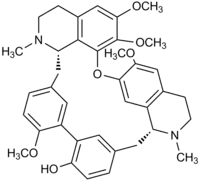Rodiasine
Rodiasine is a cyclic bisbenzylisoquinoline alkaloid that was first isolated from the South American greenheart tree Chlorocardium rodiei.[1] The synthesis of O-demethylrodiasine (antioquine) and its derivatives, and the possible application of these compounds as anti-cancer, calcium channel blockers, and anti-parasitic drugs has been described.[2][3]
 | |
| Identifiers | |
|---|---|
3D model (JSmol) |
|
| ChEBI | |
| ChEMBL | |
| ChemSpider | |
PubChem CID |
|
CompTox Dashboard (EPA) |
|
| |
| |
| Properties | |
| C38H42N2O6 | |
| Molar mass | 622.75 g/mol |
Except where otherwise noted, data are given for materials in their standard state (at 25 °C [77 °F], 100 kPa).
Infobox references | |
References
- Grundon, M.F.; McGarvey, J.E.B. (1966). "Alkaloids from greenheart. Part III. The structure of rodiasine. Mass spectra of bisbenzylisoquinoline alkaloids". Journal of the Chemical Society C: Organic. 1966: 1082–1084. doi:10.1039/J39660001082.
- Bentley, K. W. (1996). "β-Phenylethylamines and the isoquinoline alkaloids" (PDF). Natural Product Reports. 13 (2): 127–150. doi:10.1039/NP9961300127.
- D'Ocon MP, Candenas ML, Anselmi E, Zafra-Polo MC, Cortes D (1989). "Antioquine: a new bisbenzylisoquinoleine alkaloid with calcium antagonist activity". Arch Int Pharmacodyn Ther. 297: 205–16. PMID 2730236.
This article is issued from Wikipedia. The text is licensed under Creative Commons - Attribution - Sharealike. Additional terms may apply for the media files.